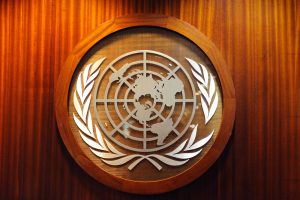After closed discussions on Wednesday, the nine-member U.N. credentials committee deferred taking any action regarding the official representation of Afghanistan and Myanmar at the United Nations. The committee presently includes the Bahamas, Bhutan, Chile, China, Namibia, Russia, Sierra Leone, Sweden, and the United States.
Sweden’s U.N. Ambassador Anna Eneström, who chaired the meeting, told reporters “the committee has decided to defer its decision of the credentials in these two situations.”
Eneström did not say how long that deferral may last.
For both the military junta that seized power in Myanmar in February 2021, and the Taliban, which took control of Afghanistan in mid-August, the matter of those countries’ U.N. seats is critical toward gaining recognition for their governments. But both U.N. seats are currently occupied by diplomats appointed by the preceding governments and who have opposed their respective irregular seizures of power.
In the case of Myanmar, the country’s ambassador, Kyaw Moe Tun, was appointed in October 2020 by the government of Aung San Suu Kyi. When the Myanmar military, called the Tatmadaw, seized power in February, Aung San Suu Kyi and others in the civilian government were detained. Kyaw Moe Tun delivered a powerful speech at the U.N. opposing the coup in late February and has continued to advocate for the ousted civilian government and against international recognition of the junta. The Tatmadaw tried to fire Kyaw Moe Tun, naming his deputy, Tin Maung Naing, as charge d’affaires, but Kyaw Moe Tun refused to step down and Tin Maung Naing resigned. The junta has appointed Aung Thurein, who retired from the Tatmadaw in 2021 after 26 years, to take the seat.
Similarly, Afghanistan’s U.N. Ambassador Ghulam Isaczai was appointed by then-President Ashraf Ghani in June 2021. Ghani fled Afghanistan in mid-August as provincial capitals surrendered to the Taliban, triggering the final collapse of his government. Isaczai did not speak at the General Debate in late September, but neither did the Taliban’s chosen representative, Mohammad Suhail Shaheen.
Both Kyaw Moe Tun and Isaczai have asked to keep their seats. And in both cases, the matter of international recognition is seen by many as leverage.
Back in August, just days after the Taliban moved into Kabul, U.N. Secretary-General Antonio Guterres said, “It’s very important for the international community to be united, for all members of the Security Council to be united, to use the only leverage that exists, which is the interests of the Taliban for legitimacy for recognition.” Guterres in subsequent comments has said that engagement with the Taliban was necessary but referenced the formation of an “inclusive government.” Taliban appeals to the U.N. have not yielded recognition yet, as the new regime’s image remains hampered by the appointing of an almost entirely Taliban and exclusively male cabinet, and ongoing restrictions on women in every aspect of life from work to education.
Days after the coup in Myanmar, Guterres said, “We will do everything we can to mobilize all the key actors and international community to put enough pressure on Myanmar to make sure that this coup fails.” In the months since, Myanmar’s military leaders have struggled for recognition, with even ASEAN excluding the junta’s leader from its annual summit in October.
When it comes to who has the right to fill a country’s U.N. seat, the U.N. charter is vague. It simply states that the body “is open to all peace-loving States that accept the obligations contained in the United Nations Charter and, in the judgment of the Organization, are able to carry out these obligations.” As I’ve written previously:
While we can list the simple attributes of a modern state — a population, a defined territory, a government — ultimately what it takes to be recognized as a state is recognition as a state by other states. While each state makes it own decisions as to which other states it recognizes, many will follow the lead of the world’s major powers. Capitals around the world will most closely track the United States and China in this regard.
There are various examples of irregular changes of government over the U.N.’s 76-year history, but no clear pattern for how and when recognition changes. To cite one extreme example: After its victory in 1949 over the forces of Chiang Kai-shek’s Republic of China, Mao Zedong’s People’s Republic of China wasn’t allowed to occupy China’s seat at the U.N. (and, importantly, its permanent place on the Security Council) until 1971.
Both Afghanistan and Myanmar have been here before, too, and with varying outcomes. In the 1990s, although the Taliban seized effective control of the country in 1996, the mujahideen held onto the country’s U.N. seat, with Abdul Ghafoor Ravan Farhadi holding it from 1993 to 2006. Meanwhile, when Aung San Suu Kyi’s National League for Democracy won a majority of seats in a general election in 1990, the first multiparty elections in Myanmar since 1960, the military government quickly annulled the results (Aung San Suu Kyi had been placed under house arrest in 1989) — and as late as 2008 the U.N. denied a request from candidates elected in the 1990 vote to replace the military’s U.N. representative.
Whether and when either the Taliban or the Tatmadaw get to appoint Afghanistan and Myanmar’s U.N. representatives is unclear. Based on past examples, it’s a question that could conceivably stretch out over decades.

































